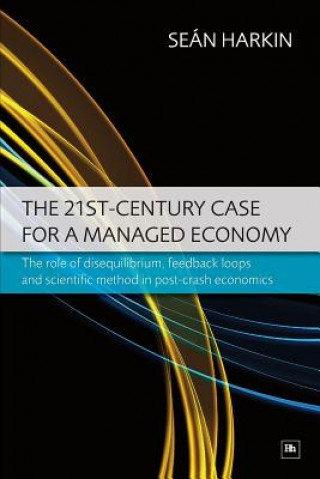
Code: 04325908
21st Century Case for a Managed Economy
by Sean Harkin
This book argues that the scientific concept of feedback - the idea that change in some element of a system can cause further change in that element - represents a general concept of economic change. Positive feedback causes runaw ... more
- Language:
 English
English - Binding: Paperback
- Number of pages: 258
Publisher: Harriman House Publishing, 2010
- More about this

27.01 €
RRP: 30.68 €
You save 3.67 €

In stock at our supplier
Shipping in 15 - 20 days
You might also like
-

New History of Italian Renaissance Art
70.70 € -

100 Years of Vintage Watches
38.46 € -

21st Century Camp Follower
33.13 € -

26th Ohio Veteran Volunteer Infantry
38.56 € -

Internationalism, National Identities, and Study Abroad
92.79 € -

Boundary Layer Flow over Elastic Surfaces
123.63 € -5 % -

Rosamunde Pilcher Giftpack
32.93 € -4 % -

Cartas a mi amor
21.48 € -

Born-Jordan Quantization
58.44 € -

Accidental Diarist
42.47 € -

Bioaktivnost' modificirovannyh guminovyh kislot
51.82 € -9 % -

Controlling von Produktbaukästen
37.25 € -10 % -

CD-My sme malí muzikanti- 2 CD
8.13 € -25 % -

Jo-Jo Sprachbuch - Allgemeine Ausgabe 2011 - 3. Schuljahr
13.25 €
Give this book as a present today
- Order book and choose Gift Order.
- We will send you book gift voucher at once. You can give it out to anyone.
- Book will be send to donee, nothing more to care about.
More about 21st Century Case for a Managed Economy
You get 68 loyalty points
 Book synopsis
Book synopsis
This book argues that the scientific concept of feedback - the idea that change in some element of a system can cause further change in that element - represents a general concept of economic change. Positive feedback causes runaway change, such as a market bubble, inflation or long-run growth, while negative feedback causes stability and stasis. Emphasising both kinds of feedback stands in contrast to the equilibrium theories of classical economics which, in effect, emphasise negative feedback only. In practical terms, the feedback perspective implies a need for extensive government involvement in the economy to suppress undesirable feedback effects - such as those causing wild instability or self-perpetuating inequality - while supporting desirable feedback effects - such as those causing economic growth. -------------------- For decades, free-market economists have told a consistent story. Markets are rational, efficient, stable and fair, and even volatile financial markets should be left mostly to their own devices. The economic crisis that began in 2007 has, however, disproven such belief in the perfection of markets. The reason market fundamentalism fails is simple: it is built on economic theories that incorporate only one half of how the economy actually operates. These theories focus on a concept of long-run equilibrium that sees the economy as being continually drawn back to balance after any change from this position, in a form of what scientists would call negative feedback. However, there is also positive feedback; a process whereby a given change amplifies itself until the system is driven far from equilibrium, and this phenomenon is equally visible in the economy. Positive feedback drives economic growth, speculative bubbles, inflation, recessions, deflation and self-perpetuating inequality. It is what gives us the secular trends and cyclical fluctuations we observe in the real economy. And it deserves to be a central part of our economic theory. This book makes a first attempt at applying the concept of feedback to economic theory and economic policy. It recognises that the state must support desirable feedbacks while suppressing undesirable ones. But it also recognises that central planning leads to oppression and inefficiency. This leads us back to the common-sense idea of a mixed economic system in which the role of the state is almost as great as that of the market.
 Book details
Book details
Book category Books in English Economics, finance, business & management Economics Economic systems & structures
27.01 €
- Full title: 21st Century Case for a Managed Economy
- Author: Sean Harkin
- Language:
 English
English - Binding: Paperback
- Number of pages: 258
- EAN: 9781906659547
- ISBN: 1906659540
- ID: 04325908
- Publisher: Harriman House Publishing
- Weight: 410 g
- Dimensions: 234 × 156 × 13 mm
- Date of publishing: 12. April 2010
Trending among others
-

Origin of Capitalism
11.54 € -13 % -

End Of The Free Market
20.38 € -17 % -

23 Things They Don't Tell You About Capitalism
11.34 € -22 % -

Entrepreneurial State
12.24 € -21 % -

Mystery Of Capital
21.38 € -

Road to Serfdom
12.14 € -15 % -

Planning for Freedom: Let the Market System Work
14.65 € -

Connectography
10.23 € -20 % -

Humankind
18.47 € -12 % -

Capitalism in America
15.16 € -28 % -

The Happiness Industry
12.64 € -13 % -

Enigma of Capital
10.23 € -28 % -

Capitalism
17.57 € -11 % -

Third Pillar
28.82 € -

Poland's Return to Capitalism
51.01 € -

Coca-Cola
14.75 € -19 % -

Cognitive Capitalism
25.80 € -6 % -

Truth About Markets
15.16 € -28 % -

Capitalism 4.0
15.06 € -18 % -

Capitalism and Modernity - The Great Debate
28.92 € -

Once Upon a Time in Russia
9.33 € -21 % -

Neoliberalism
23.89 € -4 % -

New Capitalist Manifesto
23.99 € -22 % -

Economics for Everyone
25.90 € -6 % -

From Gold to Euro
115.19 € -

Cancer Stage of Capitalism
39.56 € -2 % -

Capitalism without Democracy
38.46 € -

Capitalism
32.73 € -

EU General Data Protection Regulation (GDPR)
166.82 € -

Humanizing the Economy
19.57 € -24 % -

Fair Division and Collective Welfare
47.70 € -

Brexit
16.86 € -4 % -

Nowa Huta
54.13 € -

Power of Capitalism
22.99 € -18 % -

Guide to Marxian Political Economy
84.86 € -4 % -

Capitalism and Its Alternatives
31.53 € -

Liquidity Lost
132.37 € -

History of Capitalism
31.63 € -

How Ukraine Became a Market Economy and Democracy
32.03 € -

That Which is Seen, and That Which is Not Seen
18.17 € -1 % -

Civil Economy
41.07 € -

Six Capitals, or Can Accountants Save the Planet - Rethinking Capitalism for the Twenty-First Century
23.59 € -10 % -

Lectures in Macroeconomics
67.68 € -

Anti-capitalism
10.74 € -24 % -

Romania
80.44 € -

Science of Getting Rich
18.17 € -

State and the Economy Under Capitalism
422.13 € -

Producing Prosperity
77.23 € -

23 Things They Dont Tell You About Capitalism
12.85 € -10 %
Collection points Bratislava a 2642 dalších
Copyright ©2008-24 najlacnejsie-knihy.sk All rights reservedPrivacyCookies


 15549 collection points
15549 collection points Delivery 2.99 €
Delivery 2.99 € 02/210 210 99 (8-15.30h)
02/210 210 99 (8-15.30h)